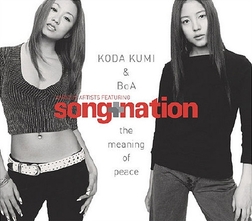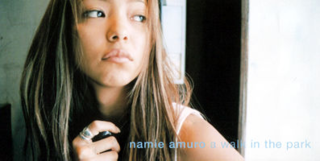
Tetsuya Komuro is a Japanese musician, singer-songwriter, composer and record producer. He is recognized as the most successful producer in Japanese music history and introduced dance music to the Japanese mainstream. He was also a former owner of the disco Velfarre located in Roppongi, Tokyo. He is widely regarded as one of the most influential figures in pop throughout the 1990s.
Hitomi Furuya, known professionally as Hitomi, is a Japanese singer-songwriter. She began her career as teen model before making her singing debuting under the helm of Tetsuya Komuro in 1994, who produced Hitomi's earliest work in pop music. Hitomi strove for artistry over the course of her career, penning "forward-looking" lyrics and becoming known for her "unusual" fashion sense that accompanied a "supermodel allure". Her signature songs include "Candy Girl", "Love 2000" and "Samurai Drive".

Concentration 20 is the third studio album by Japanese singer Namie Amuro, released July 24, 1997 by Avex Trax. The album's genre is a fusion of styles including pop, dance and rock. Unlike Amuro's previous effort, Sweet 19 Blues, which primarily had lyrics written by Tetsuya Komuro, Concentration 20's lyrics were mostly written by Marc Panther. Komuro did, however, compose and arrange most of the album's songs and wrote the lyrics to three of them.

Sweet 19 Blues is the second studio album by Japanese recording artist Namie Amuro. The album was released in four different slipcases, with the first three cases limited to 1,000,000 copies each—were put on sale on July 20, 1996 throughout Japan, and were distributed two days later to the rest of Asia by Avex Trax. The album was primarily handled by Japanese producer Tetsuya Komuro, with the assistance of Cozy Kubo, Akio Togashi, Takahiro Maeda, M.C.A.T. and Randy Waldman.

"The Meaning of Peace" is a single by Japanese R&B singer-songwriter Koda Kumi and South Korean pop singer-songwriter BoA. The single debuted on Oricon and No. 12 and remained on the charts for twelve weeks.
"White Key" is the fourth single released by Japanese singer Ami Suzuki under music label Sony Music in December 1998.

"Can You Celebrate?" is Namie Amuro's seventh solo single under the Avex Trax label. Released on February 19, 1997, "Can You Celebrate" is the best-selling single by a solo female artist in Japanese music history, with sales of 2,296,200 copies.

"A Walk in the Park" is a song by Japanese recording artist Namie Amuro from her third studio album Concentration 20 (1997). The song was released as the album's lead single on November 27, 1996. It was written, composed and produced by Tetsuya Komuro. The song is a dance track, which features instrumentation from guitars, synthesizers, organs, keyboards and drums. "A Walk in the Park" and "Can You Celebrate?" were both theme songs for Maxell UD commercials and Whisper was used as the background music for the Maxell MD74 commercial.

"Body Feels Exit" is Namie Amuro's debut solo single on the Avex Trax label. Released nine days after her only album with former label, Toshiba-EMI, "Body Feels Exit" debuted in the top three on the Oricon chart and would be her first of 24 consecutive top ten solo singles.

"Chase the Chance" is Namie Amuro's second solo single on the Avex Trax label. Released in December 1995, it debuted at number one on the Oricon charts becoming her first of five million selling singles. As of August 2012, the single has sold 1.3 million copies in Japan. At the end of the month, she would make her first appearance as a solo artist on Kōhaku Uta Gassen performing the single. It is the last single before she and MAX permanently split ways, even though MAX do not appear in the accompanying music video.

"Don't Wanna Cry" is Namie Amuro's third solo single on the Avex Trax label. It is her second consecutive million selling single as well as her second consecutive number one single. In December, the single took home the "Grand Prix Award" from the 38th Annual Japan Record Awards. 19 years old at the time, she is the youngest artist to have been awarded the grand prize.

"Dreaming I was Dreaming" is Namie Amuro's ninth single on the Avex Trax label. Released after the announcement of her pregnancy and marriage to SAM of the group, TRF, it debuted at #1 on December 8, 1997. The single does not appear on any of Amuro's original albums but does appear on her first compilation album, 181920 (1998). The song samples the T. Rex song "Liquid Generation". It was her last original single before taking a year leave in 1998. The single was certified double platinum by the RIAJ for 800,000 copies shipped to stores.

"Love 2000" is Namie Amuro's 15th single on the Avex Trax label. First pressing privileges came with a bonus remix of the title track. The same remix was later included on a vinyl single released two months after the CD version. Released in Japan on New Year's Day, the single debuted at #4 becoming her 15th consecutive top 10 solo single. The single was certified platinum for 400,000 copies shipped.

Go to the Top is the debut album by Japanese singer-songwriter Hitomi, released on September 27, 1995 by Avex Trax. The first press edition of the album came with the CD case housed inside a hardback case, similar to a book. The inside of the back of the case contains a mini-photobook. The RIAJ has certified it 2x platinum, recognizing over 500,000+ shipments throughout Japan. On the Oricon charts, the album's peak position was #3, and it stayed on the charts for eight weeks.

"We Are "Lonely Girl"" is the second single by Japanese singer-songwriter Hitomi and was released on February 22, 1995 by Avex Trax. It appears remixed on her debut studio album Go to the Top and in its original form on the 1999 best-of H and on the 2007 three disc set Peace.

"Anata no Sedai e Kuchizuke o" is the eighth single by Japanese recording artist Arisa Mizuki. It was released on February 13, 1995, as the first single from Mizuki's fourth studio album Cute.

"Feel the Love" is a song recorded by Japanese recording artist Ayumi Hamasaki. It was released in six different formats on December 25, 2013 by Avex Trax, Avex Taiwan, and Avex Entertainment Inc. worldwide. It was also her first physical release in three years since her EP–single L (2010), and her first double A-side single, alongside the track "Merry-Go-Round", since "Moon" and "Blossom" that same year. The track was written by the singer, whilst production was handled by Japanese musician and long-time collaborator Max Matsuura with the assistance of DJ Hello Kitty; this marks the singer's first single to be produced with another producer outside of Matsuura. Musically, "Feel the Love" is an electronic dance song that lyrically focuses on love and having a good time.

A One is the sixteenth full-length studio album recorded by Japanese singer Ayumi Hamasaki. It was released on April 8, 2015 by Avex Trax. It reached #4 on the Oricon charts.

Self Portrait is the second greatest hits album by Japanese singer and songwriter Hitomi. It was released through Avex Trax on September 4, 2002, coinciding with the video album Hitomi Live Tour 2002 Huma-Rhythm. The two-disc compilation spanned Hitomi's eight-year career at that point; viewing it as the beginning of a fresh start, she devised a release "atypical" of the traditional greatest hits format.
Tetsuya Komuro Archives refers to two separate box set releases featuring songs from various artists that were produced by the retired Japanese musician Komuro Tetsuya. They were released on June 27, 2018 by the Japanese record label Avex Trax. The box sets were released as Tetsuya Komuro Archives "T" and Tetsuya Komuro Archives "K", with each box set containing fifty songs divided into four separate discs.

















